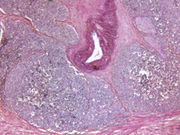Across cohorts of men undergoing screening, considerable variation in risk factor estimates
THURSDAY, Nov. 3, 2016 (HealthDay News) — For screened men enrolled in prostate cancer prevention trials, there are considerable differences in risk factor estimates for prostate cancer, according to a study published online Oct. 28 in the Journal of Clinical Oncology.
Catherine M. Tangen, Ph.D., from the Fred Hutchinson Cancer Research Center in Seattle, and colleagues examined factors related to who undergoes a prostate biopsy in a screened population. Incident prostate cancer cohorts were defined by examining men who were regularly screened from the placebo arms of two large prostate cancer prevention trials (Prostate Cancer Prevention Trial [PCPT] and Selenium and Vitamin E Cancer Prevention Trial [SELECT]).
The researchers found that after adjustment for age and longitudinal prostate-specific antigen and digital rectal examination, men aged 60 to 69 years, those with benign prostatic hyperplasia, and those with a family history of prostate cancer were more likely to undergo biopsy and those with a higher body mass index, diabetes, or smoking history were less likely. Medication use, education, and marital status also impacted who underwent biopsy. Across cohorts there was variation in some risk factor estimates for prostate cancer. The odds ratios for black versus other ethnicities varied from 1.2 for SELECT to 1.83 for PCPT. Statin use correlated with an odds ratio of 0.65 in SELECT and 0.99 in PCPT.
“Risk factors for prostate cancer derived from epidemiologic studies not only may be erroneous but may lead to misdirected research efforts,” the authors write.
Several authors disclosed financial ties to the biopharmaceutical industry.
Full Text
Copyright © 2016 HealthDay. All rights reserved.








